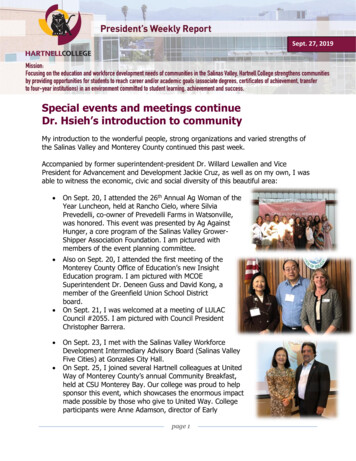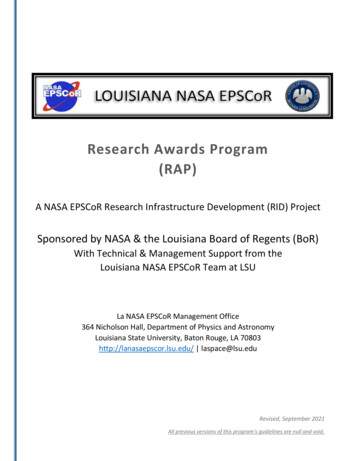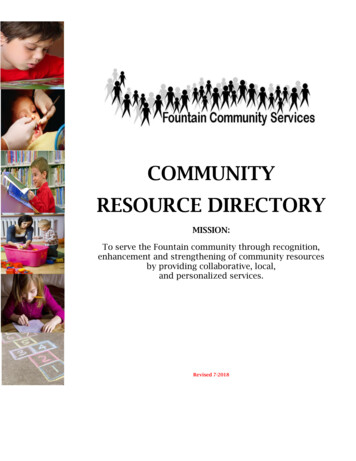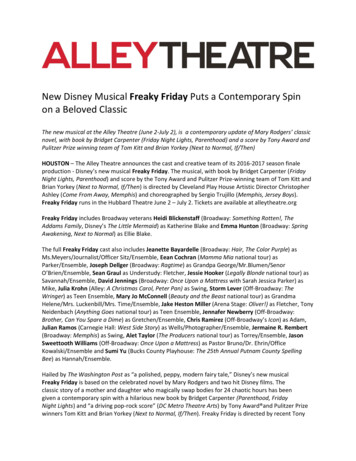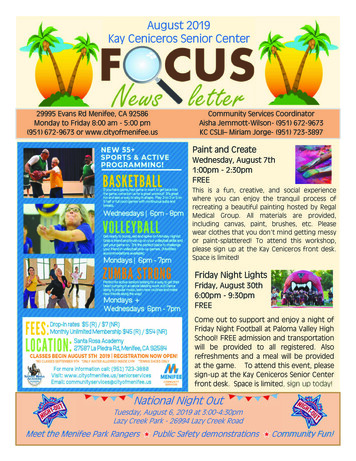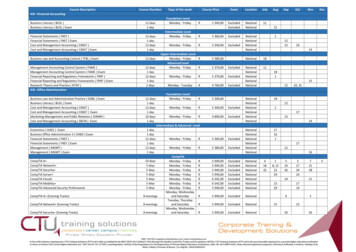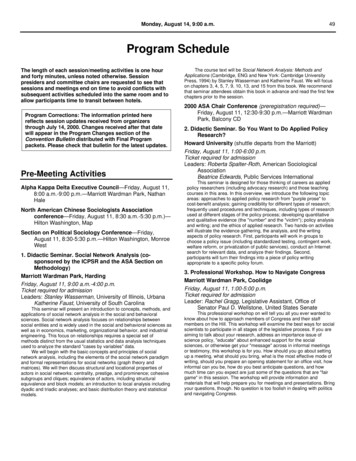
Transcription
Friday, 8:00 a.m.–8:30 p.m.Friday, March 17Special Events and MeetingsAll sessions and events are located in the Oregon Convention Centerunless otherwise noted.Mentoring@CsBreakfast: D130, 8:00 a.m.–9:15 a.m.Meeting: A103, 7:30 p.m.–8:30 p.m.Mentoring@Cs central goal is to forge informal mentoring relationships betweennewcomers and veterans in the field. The CCCC Committee on the Status of Graduate Students (4C SOGS) and the Writing Program Administration Graduate Organization (WPA-GO) partner each year (since 2015) to match mentees and mentorsbased on specific research, teaching, and professionalization interests, put them inemail contact with one another, and encourage them to meet and chat at the conference by providing a number of social gathering opportunities.Standing Group for Effective Practices in Online WritingInstruction: New BeginningsDoubleTree Hotel, Morrison Room9:30 a.m.–12:00 p.m.Co-Chairs: Kevin DePew, Old Dominion UniversityScott Warnock, Drexel UniversityThis will be the first meeting of the Standing Group for Effective Practices in OnlineWriting Instruction.Planning for Next Year’s CCCC ConventionAction Hub2:00–3:00 p.m.Individuals interested in discussing program proposals for the 2018 CCCC AnnualConvention in Kansas City, MO, March 14–17, are invited to meet Asao Inoue, 2018Program Chair, in the Action Hub.CCCC Awards/Recognition ReceptionPortland Ballroom 252 & 2535:00 p.m.–6:30 p.m.CCCC CONVENTION, portland 2017c183-336-4Cs-2017.indd 1831832/8/17 9:55 AM
Friday, 7:00 p.m.–1:30 a.m.Inclusive Arts Vibe Dance Company PerformancePortland Ballroom 251 & 2587:00–8:00 p.m.In collaboration with the Portland Disability Art and Culture Project, the StandingGroup for Disability Studies is sponsoring a performance by the Inclusive Arts VibeDance Company (IAVDC). The IAVDC strives to build “an equitable communitythrough dance” by providing integrated dance classes to youth with and without disabilities. Don’t miss this amazing performance!The 30th Annual Poetry Forum: Exultation of LarksD1327:30 p.m.–10:30 p.m.Chair: Katherine Oldmixon, Huston-Tillotson University, Austin, TXFacilitator: Jennine Krueger, Huston-Tillotson University, Austin, TXThis forum has become a valued annual gathering for CCCC poets and friends of poetry. Those who write should bring original material to read for about five minutes.Those who enjoy the company of poets should come to listen, respond, and sharein the pleasures of the occasion. Poet readers should contact Katherine Oldmixon(kdoldmixon@htu.edu) if they have questions.Caucus after the CaucusPortland Ballroom 2548:00 p.m.–9:00 p.m.AA and Al-Anon Meeting Space8:00 p.m.–10:00 p.m.Meeting space is set aside for those who desire to have an AA or Al-Anon meeting.AA, Room D133Al-Anon, Room D134CCCC JamPortland Ballroom 251 & 2589:30 p.m.–1:30 a.m.CCCC isn’t CCCC without a night of fun, dancing, and partying! And Friday nightwill be the jam to beat all jams. So bring your best two-step and your coolest movesand get your party on at CCCC 2017!184c183-336-4Cs-2017.indd 1842/8/17 9:55 AM
Friday, 8:00–9:15 a.m.F Sessions: 8:00–9:15 a.m.Poster SessionsPortland Ballroom LobbySeeking “Quality” in Contract Grading: A Case Study of a TechnicalWriting ClassroomThis poster presents research from a contract grading study implemented in atechnical writing classroom in the Northeast.Lisa Litterio, Bridgewater State UniversityBoundaries to the Instructional Use of Facebook: A Grounded TheoryCollective Case StudyThis presentation, based on a grounded theory study, will include a frameworkof five boundaries to the instructional use of Facebook.Jodi Whitehurst, Arkansas State University-BeebeCultivating Relationships and Transforming Culture in Writing ProgramsUsing Liberating StructuresAn Appreciative Inquiry about program planning and a discussion aboutLiberating Structures, building trust, and unleashing innovation!Lucia Dura, University of Texas at El PasoCultivating Cross-Disciplinary Connections: Faculty Perspectives onWriting-Intensive CoursesA qualitative research project intended to determine the experience, values, andneeds of faculty teaching writing-intensive courses.Jen Talbot, University of Central ArkansasTechnical Writing Strategies for the CTE TeacherThis poster session examines high school career and technical educationteachers’ responses to workshop training in technical writing strategies forclassrooms.Teresa Farrell, Eastern Oregon UniversityHierarchies and Harkness: Shifting from the Podium to Encircled Modesof InvestigationThis poster session advocates for the use of the Harkness method in theanalysis of literature in the classroom.Christian Gregory, Teachers College, Columbia UniversityCCCC CONVENTION, portland 2017c183-336-4Cs-2017.indd 1851852/8/17 9:55 AM
Friday, 8:00–9:15 a.m.“To the King and Councell”: Situating Early Quaker Women’s Petitions toAuthoritiesAnalysis of 17th-century Quaker women’s letters to authorities, as bothtraditional deliberative rhetoric and feminist critique.Elizabeth Imafuji, Anderson UniversityQuestioning, Negotiating, Cultivating: Student Editors and MultimodalSubmissionsResearch analyzing how student editors define effective multimodalcomposition and cultivate that knowledge across the university.Dalyn Luedtke, Norwich University, Northfield, VTCultivate and Think Tank SessionsThink Tank on CCCC Student Veteran PolicyF.01Think Tank on Cultivating Change for Current, Former,and Future Members of the Military in CompositionStudiesWith all branches of the US military affected by reduced fiscalresources, dwindling troop strength, and a lack of a unified mission,the perceptions and experiences of transitioning military personnelmay be distinctly different in 2016 than they were in 2011; in lightof these evolving changes, college composition faculty face a newset of challenges for responding to transitioning service members.The 2017 CCCC Convention presents an excellent opportunity forcultivating conversation about what the 2015 CCCC student veteranpolicy is doing (for writing teachers, administrators, military students,and student veterans) two years since its passing. How does thispolicy stand up against the evolving experiences of service memberstransitioning out of the military and into college? This Think Tanksession is meant to spark communication, build upon the community,and move us toward continued, sustainable efforts for working withmilitary-affiliated students in writing programs and classes. Groundedin the Student Veterans in the College Composition Classroom policystatement, facilitators will lead attendees through reflection, scrutiny,and enacting change locally and nationally.Portland Ballroom 257Facilitators: Lt. Col. Alan Brown, United States Military Academy,West Point, NYMariana Grohowski, Indiana University Southeast186c183-336-4Cs-2017.indd 1862/8/17 9:55 AM
Friday, 8:00–9:15 a.m.Cultivating Policy AdvocacyF.02Taking Action: Everyday AdvocacyThis session introduces participants to the idea of EverydayAdvocacy: that, given the current narrative surrounding educationalissues, we as teachers and scholars have a unique role in providingthe public with a different narrative about issues we care about deeply(writing pedagogy, literacy, testing, etc.). Based in last year’s CCCCsTaking Action Workshops and the Everyday Advocacy website(everydayadvocacy.org), the session will introduce participants to thebackground of this movement and the concepts that ground it; offerexamples of how compositionists might introduce the ideas behindEveryday Advocacy to their graduate students and colleagues (througha full course in advocacy for writing teachers; through three-daysummer workshops for K–16 teachers; and through existing courses);and work with participants to determine how they might incorporateadvocacy approaches into their own teaching and how to get started.In addition to this Cultivate session, Cathy Fleischer will offerEveryday Advocacy sessions in the Action Hub on Thursday(10:30–11:45 a.m.) and Friday (12:30–1:45 p.m.).Portland Ballroom 256Facilitators: Linda Adler-Kassner, University of California, SantaBarbaraCathy Fleischer, Eastern Michigan UniversityCultivating Professional Engagement through MentoringF.03Cultivating Capacity: Mentoring Challenges andOpportunitiesThis Cultivate session will take an action-oriented look at thechallenges and opportunities inherent in mentoring with the goal ofcultivating new voices in our field and in our organizations. Drawingon their experiences as both mentees and mentors, the facilitators ofthis session will focus especially on the kind of informal mentoringthat can encourage a colleague to propose his first conferencepresentation or to run for an office in her regional TYCA association.Consideration also will be given to mentoring as a way of being,personally and professionally, as well as valued and necessarythroughout one’s career. Participants will be invited to share examplesof effective and ineffective mentoring and to articulate new wayscontinued on next pageCCCC CONVENTION, portland 2017c183-336-4Cs-2017.indd 1871872/8/17 9:55 AM
Friday, 8:00–9:15 a.m.they might encourage their own and their colleagues’ growth anddevelopment.Portland Ballroom 255Facilitators: Ruben Casas, California State University, FresnoResa Crane Bizzaro, Indiana University of PennsylvaniaLisa Ede, Oregon State UniversityDodie Forrest, Yakima Valley Community CollegeAsao Inoue, University of Washington, TacomaEva Payne, Chemeketa Community CollegeVershawn Young, University of Waterloo, Canada3-Community, Civic & PublicF.04Cross-Caucus Community EngagementCross-Caucus Sponsored SessionLeaders from identity-based caucuses will lead discussions andconversations focused on identity-based community engagement.Portland Ballroom 252Chair: Cristina Kirklighter, Texas A&M University, Corpus ChristiSpeakers: Isabel Baca, University of Texas at El Paso, “Latin@ CaucusCommunity Engagement”Collin Craig, St. John’s University, “Black Caucus CommunityEngagement”Rebecca Hayes, Michigan State University, East Lansing, “Queer CaucusCommunity Engagement”Terese Guinsatao Monberg, Michigan State University, “Asian/AsianAmerican Caucus Community Engagement”Joyce Rain Anderson, Bridgewater State University, “American IndianCaucus Community Engagement”8-LanguageF.05What Linguistics Can Offer the Composition TeacherSponsored by the Linguistics, Language, and Writing Standing GroupCurrent work in linguistics provides powerful tools for analyzing andcreating texts in multiple contexts, at the sentence level and beyond.F151188c183-336-4Cs-2017.indd 1882/8/17 9:55 AM
Friday, 8:00–9:15 a.m.Speakers: Nora Bacon, University of Nebraska at OmahaMichael Israel, University of Maryland, College ParkDaniel Kies, College of DuPageSandra Kies, Benedictine UniversityCameron Mozafari, University of Maryland, College ParkRespondent: Rei Noguchi, California State University, Northridge1-First-Year and Advanced CompositionF.06Capacity, Action, and Change: 21st-Century Implicationsfor Student Retention in First-Year WritingIn this presentation, four speakers will discuss the history and theory thatguides retention-based initiatives in first-year writing.A105Speakers: Jonathan Bush, Western Michigan University, KalamazooJeanne LaHaie, Klamath Community CollegeStaci Perryman-Clark, Western Michigan University, KalamazooAdrienne Redding, Western Michigan University, KalamazooRespondent: Staci Perryman-Clark, Western Michigan University,Kalamazoo8-LanguageF.07Multilingualism, Identity, and PowerThis panel looks at the ways that multilingual speakers assert their agencyand resist efforts to disempower them.B112Chair: Susan Youngblood, Auburn UniversitySpeakers: Lava Asaad, Middle Tennessee State University, “I’m a Refugeeand I’m OK: Instructor’s Identity in Resisting Classrooms”Nancy Bou Ayash, University of Washington, Seattle, “From Beirut toSeattle: Unpacking Tensions of Language Difference in SuperdiverseUrban Eduscapes”Maria Carvajal, University of Illinois at Urbana-Champaign, “‘I Don’tJust Speak English. And I Don’t Just Speak Spanish. I Speak Both:’Pedagogical Implications and Applications of Students’ Definitions ofSpanglish”Sammantha McCalla, St. John’s University, “Language as Criteria for FullCitizenship: A Look at the Dehumanization of Patois Speakers”CCCC CONVENTION, portland 2017c183-336-4Cs-2017.indd 1891892/8/17 9:55 AM
Friday, 8:00–9:15 a.m.7-Institutional and ProfessionalF.08Social Advocacy Education in the Most Segregated Cityin AmericaCross-disciplinary collaboration fostered development of an Associate ofArts in Social Advocacy to prepare students to challenge inequities.C120Chair: Jennifer Mikulay, Milwaukee Area Technical College, “FacilitatingCross-Disciplinary Program Development in the Most Segregated Cityin America”Speakers: Kimberly OmniEssence, Milwaukee Area Technical College,“Championing Change through Small-Group Communication in theMost Segregated City in America”Anna Varley, Milwaukee Area Technical College, “Reading and Writingfor Advocacy in the Most Segregated City in America”12-TheoryF.09Reading and Listening as Writing Students and WritingTeachersPanelists argue for a more capacious understanding of reading andaudience that incorporates listening to our readers, writers, and students.D140Chair: Jennie Vaughn, Gannon UniversitySpeakers: Daniel Keller, The Ohio State University at Newark,“Theorizing Audience for Readers and Writers”Beau Pihlaja, The University of Texas at El Paso, “Lurking as RhetoricalListening: Cultivating Productive Engagement on Race with SocialMedia”Kara Wittman, Pomona College, “‘On the Presumption of Knowing Howto Read’: Teaching Our Own Literacy in a Writing Classroom”8-LanguageF.10The Rhetorical Choices of Migrant Adolescents inStructured Debate Competitions DemonstratingLanguage Finesse and Growth MindsetThis session focuses on the discourse of adolescent migratory farmworkersthat indicates a growth mindset of learning.D133Speakers: Julie Antilla-Garza, Seattle Pacific UniversityKristine Gritter, Seattle Pacific University190c183-336-4Cs-2017.indd 1902/8/17 9:55 AM
Friday, 8:00–9:15 a.m.14-Cultivating Connections, Cultivating SpaceF.11Interacting with TextsInnovative ways of interacting with texts within and beyond thecomposition classroom.F152Chair: Paul Walker, Murray State UniversitySpeakers: Rita Celariste, SUNY New Paltz, “Challenging Assumptions:Educational Opportunity Program Career Project”Mary Fakler, SUNY New Paltz, “Challenging Assumptions: EducationalOpportunity Program Career Project”Susan Gebhardt-Burns, Norwalk Community College, “Stand Up! TheUsefulness and Importance of Conferencing While Standing (versusSitting) in the Composition Classroom”Joan Perisse, SUNY New Paltz, “Challenging Assumptions: EducationalOpportunity Program Career Project”Ben Stewart, New York University, “Distant Reading without Computers”11-Writing Pedagogies and ProcessesF.12Sowing the Seeds of Change: Enacting Agency andAction through a Transformative Multiliteracy PedagogyResearch findings and student artifacts supporting a transformativepedagogical stance attained through multimodal and digital practices.B114Speakers: Marilyn Buono, Hofstra UniversityJosefa Pace, Sonoma State UniversityMelinda Smith, Hofstra University/Manhasset Public Schools10-ResearchF.13A Transition Point: Developing Writing Capacity forFirst-Generation College StudentsThis panel presents findings from three qualitative studies of writingtransitions of first-generation college students.C124Speakers: Katherine Alford, Arizona State UniversityJessica Early, Arizona State UniversityChristina Saidy, Arizona State UniversityCCCC CONVENTION, portland 2017c183-336-4Cs-2017.indd 1911912/8/17 9:55 AM
Friday, 8:00–9:15 a.m.13-Writing ProgramsF.14Creating a Community of Writing Programs: ACollaboration with the Community College SystemSince 2009, a university WAC program has collaborated with faculty inthe state’s community colleges to support development of WAC courses.F150Chair: Georgia Rhoades, Appalachian State University, “Writing AcrossInstitutions: An Eight-Year Collaboration”Speakers: Sharon Alusow Hart, Appalachian State UniversityDennis Bohr, Appalachian State UniversityAmanda Finn, Appalachian State UniversityGeorgia Rhoades, Appalachian State University12-TheoryF.15Teaching and Assessing for Racial JusticeThis panel offers strategies for promoting equity and racial justice inteaching, assessment, and evaluation.Portland Ballroom 254Chair: Aja Martinez, Binghamton University, SUNYSpeakers: Brian Bailie, University of Cincinnati, Blue Ash College,“‘Teaching While White’: Race, Writing, and Rhetoric in theComposition Classroom”Candace Epps-Robertson, Old Dominion University, “‘Teaching WhileBlack’: Pedagogical Strategies for Facing Resistance”Nicole Gonzales Howell, University of San Francisco, CA, “WritingAssessment and Race: The Politics of Classroom Management andGrading Practices”Zosha Stuckey, Towson University, “‘Intergroup Dialogue’ as a Pedagogyfor Racial Justice”13-Writing ProgramsF.16Race Matters in Centers and ProgramsSpeakers explore the issues of who tutors and who uses writing centerservices: race matters.E148Chair: Peter Vandenberg, DePaul University192c183-336-4Cs-2017.indd 1922/8/17 9:55 AM
Friday, 8:00–9:15 a.m.Speakers: Mark Bennett, University of Illinois at Chicago, “SupportingStudent Writers at a Dual AANAPISI/HSI University”Collie Fulford, North Carolina Central University, “Austerity’s Invention:Advancing an Advanced Writing Curriculum in Hard Times”Jennifer Marciniak, Berea College, “Exploring Reasons Why AfricanAmerican Students Might Hesitate to Work as Writing CenterConsultants: A Study of Berea College”Elijah Simmons, Miami University, “Where is ma Migo?”5-HistoryF.17Composition in the Eighties: Retrospect and ProspectThe 1980s were a watershed decade for composition. Three teacherscholars whose early careers were forged then will each exam a key idea.E145Chair: Irwin Weiser, Purdue UniversitySpeakers: Douglas Hesse, The University of Denver, Colorado, “WordStarand Dual Floppies: Lingering Lessons from the First Large WritingProgram Taught Exclusively in Computer Classrooms”Steve North, University at Albany, SUNY, “What Is (Writing Beyond)Composition?”Kathleen Blake Yancey, Florida State University, “The More ThingsChange, the More . . . : The Role of the Student-as-Composer inComposing Process Research Past and Present”Respondent: Jody Shipka, University of Maryland, Baltimore County10-ResearchF.18Investigating Cognition in Writing Development: Habits ofMind, Deliberate Practice, and the Potential of Big DataAdaptive learning platforms can enable both the deliberate practicenecessary for writing development as well as Big Data research.E142Chair: Gwen Gorzelsky, Colorado State UniversitySpeakers: Gwen Gorzelsky, Colorado State UniversityCarol Hayes, The George Washington University, Washington, DCJoseph Paszek, University of Detroit MercyCCCC CONVENTION, portland 2017c183-336-4Cs-2017.indd 1931932/8/17 9:55 AM
Friday, 8:00–9:15 a.m.11-Writing Pedagogies and ProcessesF.19Teaching Writing to Veterans and Active MilitaryPersonnelThis session explores curricular strategies that cultivate community andrhetorical acumen among students who are active military personnel orveterans.C126Chair: Mark Blaauw-Hara, North Central Michigan College, Petoskey,“Perceptions of Identity and Influence: Preliminary Results froma Multi-Year Study with Student Veterans beyond First-YearComposition”Speakers: Lourdes Fernandez, George Mason University, “Communitiesof Practice on the Military Base: Cultivating Composition InstructorEthos, Identity, and Participation”Corrine Hinton, Texas A&M University Texarkana, “Perceptions ofIdentity and Influence: Preliminary Results from a Multi-Year Studywith Student Veterans beyond First-Year Composition”Bree McGregor, George Mason University, “Communities of Practice onthe Military Base: Cultivating Composition Instructor Ethos, Identity,and Participation”Melody Pugh, United States Air Force Academy, “Firing the ‘NewCanon’: Reconsidering the Rhetoric of ‘Skills-Based’ Writing Courses”3-Community, Civic & PublicF.20(In)capacities of Anti-Semitism: Composition, Writing,and the Israeli/Palestinian DebateThe panelists aim to “create capacities” for debating anti-Semitism as itappears in writing both inside and outside the academy.E146Speakers: Andrea Greenbaum, Barry University, “Die Saeuberung:Cleansing the Academy and the Stillness of Opposition: A VisualAnalysis”Brandon Katzir, Louisiana State University, “‘A Polite Hatred’: AntiSemitism, Academia, and the Anglophone Left”Jennifer Rice, University of Kentucky, “Definitional Impasse: The MessyRhetoric of Anti-Zionism and Anti-Semitism”Jaime Wright, St. John’s University, “Debate as State of Exception”Respondent: Deborah H. Holdstein, Columbia College Chicago194c183-336-4Cs-2017.indd 1942/8/17 9:55 AM
Friday, 8:00–9:15 a.m.1-First-Year and Advanced CompositionF.21Critical Approaches to Integrating Reading and WritingPanelists share how students are engaged through “reading” of humor andfilm.A103Chair: Eric Detweiler, Middle Tennessee State UniversitySpeakers: Anita August, Sacred Heart University, “A Terrible Beauty IsBorn!—Cultivating Critical Consciousness and Classroom CommunityUsing Visual Trauma as Narrative in First-Year Composition (FYC)”Kirk Boyle, University of North Carolina at Asheville, “CultivatingRhetorical Consciousness through Comedy: The PortlandiaAssignment”Amy Green, Hobart and William Smith Colleges, “In Their Own Words:Reading and Writing as Generative, Recursive Practices in theComposition Classroom”Barbara Smith, University of Central Missouri, “Cultivating ReadingEngagement”11-Writing Pedagogies and ProcessesF.22Cultivating Online Pedagogy: Feedback, Workshops, andExperiential Learning in First-Year CompositionThis panel discusses issues related to instructor feedback, peer review, andcourse design in online composition classrooms.B116Speakers: Jennifer Cunningham, Kent State University at Stark, “OnlineComposition Students’ Responses to Instructor Feedback”Steve Edgehouse, Stark State College, “Vlogshopping: Using Video toEnhance Online Writing Workshops”Lauren Garcia-DuPlain, The University of Akron, “Monoculture CourseDesign: An Experiment in Online, Experiential English Composition”CCCC CONVENTION, portland 2017c183-336-4Cs-2017.indd 1951952/8/17 9:55 AM
Friday, 8:00–9:15 a.m.14-Cultivating Connections, Cultivating SpaceF.23Backward, Forward, Outward, Onward: CultivatingConnections between Writing Studies and EnglishStudiesFacing the challenges of cultivating connections between writing studiesand other areas of English study in an era of hyperspecialization.Portland Ballroom 251Speakers: Darin Ciccotelli, Soka University of America, “Post-ProcessTheory and Creative Writing”Brandee Easter, University of Wisconsin-Madison, “Peer Review andWorkshop Pedagogy: Troubled Histories”Tim Mayers, Millersville University, “Institutional Histories and WritingStudies”Julie Alexander, Miami University, “Business Writing and CreativeWriting: Converging Agendas”James Ryan, University of Wisconsin-Madison, “Peer Review andWorkshop Pedagogy: Troubled Histories”Jonathan Udelson, University of Louisville, “Creative Writers in theComposition Classroom”7-Institutional and ProfessionalF.24The Language of Technology in Professional Documentsand Local Contexts: Cultivating TechnologicallyResponsive Positions, Practices, and PersonsResults of a review of the language of technology in 40 years ofprofessional statements and how such language can shape teacherpreparation.D131Speakers: Kerri Hauman, Transylvania UniversityStacy Kastner, Mississippi State UniversityAlison Witte, Trine University, Angola, IN3-Community, Civic & PublicF.25I Have the Best Words: What Rhetoric Can Learn fromDonald TrumpThis roundtable explores the impact of the Trump presidential campaignon rhetoric, politics, and public discourse.Portland Ballroom 253Speakers: Collin Brooke, Syracuse University, “Don’t Read theComments? How #Trump Broke/red the Internet”196c183-336-4Cs-2017.indd 1962/8/17 9:55 AM
Friday, 8:00–9:15 a.m.Trish Roberts-Miller, University of Texas at Austin, “Trump and theDemagoguery Charge”Ryan Skinnell, San Jose State University, “Trump’s Stump: On the RiskyAppeal(s) of Donald Trump’s Anti-Rhetoric”Brad Vivian, Pennsylvania State University, “Donald Trump, NeoliberalAssemblages, and Late Modern Sovereignty”Amy Young, Pacific Lutheran University, “Rhetorics of Fear andLoathing: Donald Trump’s Populist Style”8-LanguageF.26Revisiting Expectations in Students’ Right to Their OwnLanguageThese panelists challenge the unstated assumptions that SRTOL dictatesdeficit in writing courses and listen to instructor aspirations and concernsin its implementation.B117Chair: Sonia Arellano, University of Arizona, TucsonSpeakers: Stephanie Boone-Mosher, University of South Carolina,Columbia, “Overworked, Underpaid, and Marginally Employed:Why Writing Teachers Resist Learning about and Enacting PluralistPedagogies”Jennifer Justice, Northern Illinois University, “More Than Remediation:SRTOL and Identity Pedagogies in First-Year Composition”Erica Lange, Ohio University, “Discontinuing Dis(missing) the SRTOL:Defending the Students’ Right to Define and Develop Their OwnLanguage in FYC”11-Writing Pedagogies and ProcessesF.27Transferring to Wonderland: How Writing Classes CanCultivate Community for Transfer StudentsPresenters share teaching strategies to connect transfer and reentrystudents to the culture of the university in required writing courses.B115Chair: Jennifer Campbell, University of DenverSpeakers: April Chapman-Ludwig, University of Denver, “‘Lost in theTulgey Woo’: Teaching Transfer Students to Navigate the WritingSequence”Robert Gilmor, University of Denver, “‘Begin at the Beginning’: Buildinga Community with Transfer Students in the Archives”Zoe Tobier, University of Denver, “‘Because I Was a Different PersonThen’: Writing Transfer Students’ Stories of Self, Community, andOther”CCCC CONVENTION, portland 2017c183-336-4Cs-2017.indd 1971972/8/17 9:55 AM
Friday, 8:00–9:15 a.m.2-Basic WritingF.28ALP at Ten: A Decade Retrospective of the AcceleratedLearning Program at the Community College of BaltimoreCountyAs ALP turns 10, the founders of the model, adopted at 230 schools, lookback on a decade of successes, missteps, and lessons learned.D136Chair: Peter Adams, Community College of Baltimore County, MDSpeakers: Susan Gabriel, Community College of Baltimore County, MDJamey Gallagher, Community College of Baltimore County, MD10-ResearchF.29Data Studies and Rhetoric and Composition:Pedagogical, Disciplinary, and MethodologicalPossibilitiesOur field can engage pedagogically, experimentally, and institutionally tohelp realize the humanistic values afforded by data studies.E141Speakers: Daniel Anderson, University of North Carolina at Chapel HillAshley Hall, Wright State UniversityJim Ridolfo, University of KentuckyCourtney Rivard, University of North Carolina at Chapel Hill8-LanguageF.31Cultivating Capacity and Creating Change for Students’Right to Their Own LanguageThis panel will examine, strategize, and theorize new possibilities for howwe consciously create the conditions for learning and for change.D135Speakers: April Baker-Bell, Michigan State University, “Writing WhileBlack: Disrupting Internalized Hegemonic Language Ideologies”Stephanie Jones, Antelope Valley College, “Connecting Strategies ofDomination: An Epistemological Analysis of Black Vernacular andCreole Englishes”Bonnie Williams, California State University, Fullerton, “Theoretical andHistorical Perspectives on Language Rights in California”198c183-336-4Cs-2017.indd 1982/8/17 9:55 AM
Friday, 8:00–9:15 a.m.9-Professional and Technical WritingF.32Genre Theory in ActionThree panelists explore information ecologies, hybridization, and thematerial constraints of genre.C122Chair: Wendy Sharer, East Carolina UniversitySpeakers: Erica Baumle, Texas Tech University, “Information Ecologies:Technical Communication in Online Game Support Community Sites”Mike Duncan, University of Houston-Downtown, “The Rhetoric of theKamikaze Manual”Jillian Hill, University of Houston-Downtown, “The Rhetoric of theKamikaze Manual”Naoko Ozaki, Rice University, “The Rhetoric of the Kamikaze Manual”Krista White, Kent State University, “Cultivating New Understandingof the Annual Report as a Hybridized Genre through Application of aHybridized Methodology”1-First-Year and Advanced CompositionF.33Teaching for Transfer beyond First-Year Composition:Professional and Business WritingPresenters consider using teaching for transfer beyond first-year writing.A104Chair: Joel Williams, Edward Waters CollegeSpeakers: E. Jann Harris, University of Nevada, Reno, “Remixing the Oldand the New: Cultivating the TFT Metaphor”Patricia Jenkins, University of Alaska Anchorage, “Applying TFT toan Upper-Division Professional Writing Course: Broadening theCurricular Reach”Cynthia Johnson, Miami University, “Broadening the Transfer Landscape:Cultivating Transfer-Focused Writing Curricula beyond CompositionPrograms”Nicole Varty, Wayne State University, “Flexible Writing in LiterateEcologies: A Longitudinal Study of Student Writing KnowledgeTransfer into, during, and after First-Year Writing”CCCC CONVENTION, portland 2017c183-336-4Cs-2017.indd 1991992/8/17 9:55 AM
Friday, 8:00–9:15 a.m.11-Writing Pedagogies and ProcessesF.34Cultivating Pedagogies for Social Justice: ExploringIssues of Diversity in Writing CoursesPedagogies for first- and second-year writing courses focused on issues ofdiversity and social justice.C123Speakers: Ann Amicucci, University of Colorado, Colorado Springs,“Student Reflection on Language Diversity: Exploring Social JusticeIssues in First-Year Composition”Sarah Hend
Eva Payne, Chemeketa Community College Vershawn Young, University of Waterloo, Canada Friday, 8:00-9:15 a.m. c183-336-4Cs-2017.indd 188 2/8/17 9:55 AM. . Jeanne LaHaie, Klamath Community College Staci Perryman-Clark, Western Michigan University, Kalamazoo Adrienne Redding, Western Michigan University, Kalamazoo .



